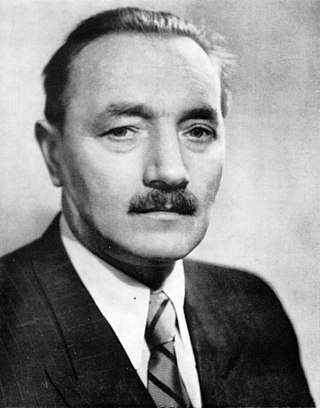
Bolesław Bierut was a Polish communist activist and politician, leader of communist-ruled Poland from 1947 until 1956. He was President of the State National Council from 1944 to 1947, President of Poland from 1947 to 1952, General Secretary of the Central Committee of the Polish United Workers' Party from 1948 to 1956, and Prime Minister of Poland from 1952 to 1954. Bierut was a self-educated person. He implemented aspects of the Stalinist system in Poland. Together with Władysław Gomułka, his main rival, Bierut is chiefly responsible for the historic changes that Poland underwent in the aftermath of World War II. Unlike any of his communist successors, Bierut led Poland until his death.
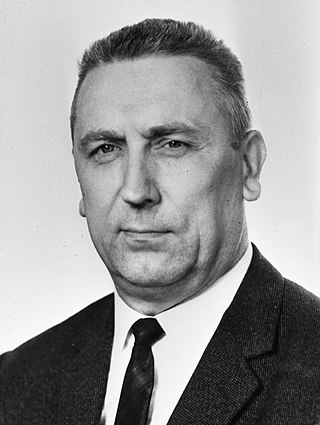
Edward Gierek was a Polish Communist politician and de facto leader of Poland between 1970 and 1980. Gierek replaced Władysław Gomułka as First Secretary of the ruling Polish United Workers' Party (PZPR) in the Polish People's Republic in 1970. He is known for opening communist Poland to the Western Bloc and for his economic policies based on foreign loans. He was removed from power after labor strikes led to the Gdańsk Agreement between the communist state and workers of the emerging Solidarity free trade union movement.
The interwar Communist Party of Poland was a communist party active in Poland during the Second Polish Republic. It resulted from a December 1918 merger of the Social Democracy of the Kingdom of Poland and Lithuania (SDKPiL) and the Polish Socialist Party – Left into the Communist Workers' Party of Poland. The communists were a small force in Polish politics.

The history of Poland from 1939 to 1945 encompasses primarily the period from the invasion of Poland by Nazi Germany and the Soviet Union to the end of World War II. Following the German–Soviet non-aggression pact, Poland was invaded by Nazi Germany on 1 September 1939 and by the Soviet Union on 17 September. The campaigns ended in early October with Germany and the Soviet Union dividing and annexing the whole of Poland. After the Axis attack on the Soviet Union in the summer of 1941, the entirety of Poland was occupied by Germany, which proceeded to advance its racial and genocidal policies across Poland.

The Polish Workers' Party was a communist party in Poland from 1942 to 1948. It was founded as a reconstitution of the Communist Party of Poland (KPP) and merged with the Polish Socialist Party (PPS) in 1948 to form the Polish United Workers' Party (PZPR). From the end of World War II the PPR led Poland, with the Soviet Union exercising moderate influence. During the PPR years, the centers of opposition activity were largely diminished, and a socialist system was established in the country.
National Democracy was a Polish political movement active from the second half of the 19th century under the foreign partitions of the country until the end of the Second Polish Republic. It ceased to exist after the German–Soviet invasion of Poland of 1939. In its long history, National Democracy went through several stages of development. Created with the intention of promoting the fight for Poland's sovereignty against the repressive imperial regimes, the movement acquired its right-wing nationalist character following the return to independence. A founder and principal ideologue was Roman Dmowski. Other ideological fathers of the movement included Zygmunt Balicki and Jan Ludwik Popławski.

The Polish Round Table Talks took place in Warsaw, Poland from 6 February to 5 April 1989. The government initiated talks with the banned trade union Solidarność and other opposition groups in an attempt to defuse growing social unrest.

The history of Poland from 1945 to 1989 spans the period of Marxist–Leninist regime in Poland after the end of World War II. These years, while featuring general industrialization, urbanization and many improvements in the standard of living, were marred by early Stalinist repressions, social unrest, political strife and severe economic difficulties. Near the end of World War II, the advancing Soviet Red Army, along with the Polish Armed Forces in the East, pushed out the Nazi German forces from occupied Poland. In February 1945, the Yalta Conference sanctioned the formation of a provisional government of Poland from a compromise coalition, until postwar elections. Joseph Stalin, the leader of the Soviet Union, manipulated the implementation of that ruling. A practically communist-controlled Provisional Government of National Unity was formed in Warsaw by ignoring the Polish government-in-exile based in London since 1940.

Jerzy Maria Kirchmayer (1895–1959) was a Polish historian and military commander, a brigadier general of the Polish Army and one of the first historians of the Warsaw Uprising of 1944.

The University of Warsaw is a public research university in Warsaw, Poland. Established in 1816, it is the largest institution of higher learning in the country, offering 37 different fields of study as well as 100 specializations in humanities, technical, and the natural sciences.

Prof. Andrzej Paczkowski is a Polish historian. Professor of Collegium Civitas, director of Modern History Studies in the Political Institute of Polish Academy of Sciences, member of Collegium of Institute of National Remembrance.

Jerzy Jan Lerski ; was a Polish lawyer, soldier, historian, political scientist and politician. After World War II he emigrated to the United States, where he became a full professor at the University of San Francisco.
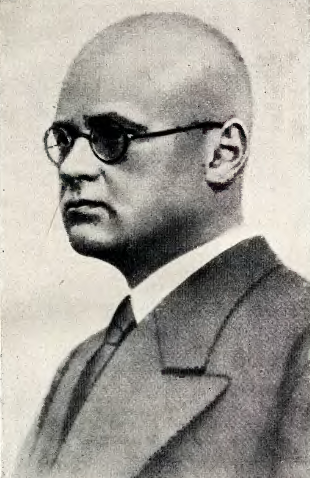
Józef Feldman was a Polish historian of Jewish ethnicity, professor of the Jagiellonian University in Kraków and a member of the Polish Academy of Learning.

Wacław Lipiński (1896–1949) was a Polish historian, military officer and resistance fighter, lieutenant colonel in the Polish Army of the Second Polish Republic, recipient of Polish highest military decoration, the Order of Virtuti Militari.

Jerzy Borejsza was a Polish communist activist and writer. During the Stalinist period of communist Poland, he was chief of a state press and publishing syndicate.
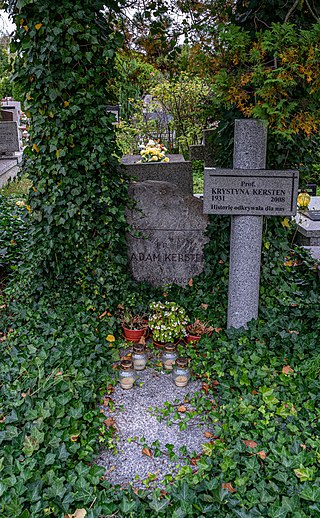
Krystyna Kersten was a Polish historian, a professor at the Historical Institute of the Polish Academy of Sciences, and a fellow of Collegium Invisibile. Described as "the first lady of Polish historiography", her essays on topics including Communism, Jews in Poland, and post-war Poland, have been collected in a number of volumes.
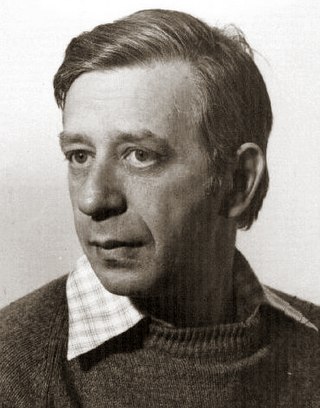
Jerzy Stanisław Holzer was a Polish historian. He specialized in the Polish history, German history, and the Polish-German relations.
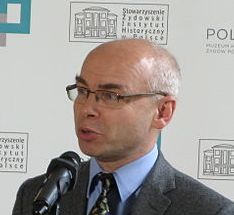
Dariusz Stola is a professor of history at the Institute of Political Studies of the Polish Academy of Sciences.

Jerzy Władysław Kolendo was an acknowledged Polish authority on the history and archaeology of Ancient Rome. He was an exponent of the French Annales school, an epigraphist and specialist in the relations between the Barbaricum and the early Roman Empire.
Jerzy Jedlicki was a Polish historian of ideas, Humanities Professor and an anti-communist activist during the times of the Polish People's Republic.
















